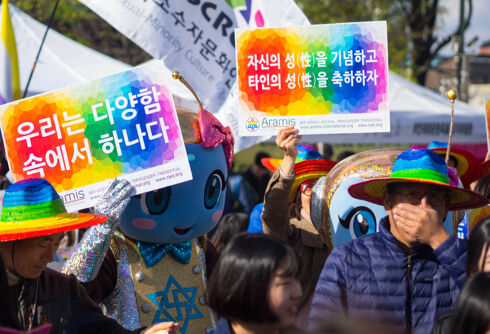A Russian court has convicted — and possibly detained and beaten — transgender blogger Milana Petrova for allegedly violating laws against spreading “LGBTQ+ propaganda” and “discrediting” the Russian military.
Petrova had allegedly posted LGBTQ+ content, including details about gender transitioning, as well as criticisms of Russia’s army on her public Telegram channel, the Russian independent news outlet Novaya Gazeta reported.
Related:
Putin says U.S. wants to push gender “perversions” on Russian schoolchildren
It’s not surprising that Putin opposes gay marriage and transgender rights. What’s surprising is how many Republicans in the U.S. agree with him.
Her channel’s content was reported to Russia’s Center for Combating Extremism by Ekaterina Mizulina, Director of Russia’s Safe Internet League. While the league purports to counteract the “distribution of dangerous content” online, it advises the government on which LGBTQ+ websites to block on the country’s internet as well as which native bloggers to “criminally punish” for advertising “filth” online.
Global perspectives delivered right to your inbox
Our newsletter bridges borders to bring you LGBTQ+ news from around the world.
Mizulina wrote via Telegram that Moscow’s Tverskoy Court had fined the blogger 200,000 rubles ($2,061 U.S.) for posting LGBTQ+ content and 50,000 rubles ($515) for “discrediting the army.” However, Petrova wasn’t present in court for the ruling, Mizulina wrote.
Over the weekend, a closed Telegram channel named Lightning Moscow reported that Petrova had been detained by Russian authorities and placed in a “special detention center for 24 hours, according to a pro-LGBTQ+ blog covering developments about the country’s propaganda law.
The post reportedly included “her photo with traces of beatings and an audio message in which Petrova says that ‘Everything is fine, relatively,’” the aforementioned site reported.
Mizulina denied these reports, writing that Petrova tried to “divorce” herself from her audience by spreading fake news about her detention.
“This was done to advertise one of the [Telegram] channels,” Mizulina wrote. She added that Russian authorities should block Petrova’s Telegram and YouTube channels because they violate Russian law.
Petrova left Russia at the end of 2021 to avoid persecution over her identity, the aforementioned blog reported. Previous to leaving, police summoned her to investigate alleged “propaganda” charges. In 2022, she announced her gender transition and launched the Bad Russians YouTube show, where she discussed her life. After the show’s first episode went live, she received many threats and promises to report her to authorities.
Russia’s infamous law against LGBTQ+ “propaganda”
Russian President Vladimir Putin first signed a law banning so-called “gay propaganda” in Russia in June 2013. The law ostensibly sought to “protect children” from any “propaganda of nontraditional sexual relationships,” as stated in the law’s text. The new law extends the restrictions to not just children but Russians of all ages.
The law has mostly been used to silence LGBTQ+ activist organizations, events, websites, and media, as well as to break up families and harass teachers. It has also been roundly condemned by the United Nations Committee on the Rights of the Child, the human rights groups Amnesty International and Human Rights Watch, as well as civil rights activists around the world.
Last December, Putin signed a law expanding the country’s prohibition on LGBTQ+ “propaganda.” The newly signed law effectively outlaws any public expression of LGBTQ+ life in Russia by banning “any action or the spreading of any information that is considered an attempt to promote homosexuality in public, online, or in films, books or advertising,” Reuters reported.
Critics say the updated law will further endanger the lives of Russia’s LGBTQ+ population, which has already suffered increased harassment, violence, and hostility in recent years. The law has recently been used to harass two young queer YouTubers and punish a man for seeking private, consensual sex.
Anti-LGBTQ+ religious leaders and right-wing political figures in the U.S. have praised Putin for his law. Indeed, Republican legislators, so-called “parents’ rights groups,” and right-wing pundits have increasingly moved to ban American kids from accessing any LGBTQ+ content, gender-affirming healthcare, or drag shows over untrue claims that these “sexualize” and “groom” children.
In 2013, Catholic Family and Human Rights Institute (C-FAM) President Austin Ruse said Russia’s anti-LGBTQ+ laws were a “good thing” that “most of the people in the United States” would support. In 2014, anti-LGBTQ+ evangelical leader Franklin Graham also defended the law.
Early into its February 2022 invasion of Ukraine, Russia quickly outlawed any negative coverage of the invasion. To this day, Russia refuses to publically refer to its deadly invasion and the deadly conflict it began as a “war,” preferring instead the term “special military operation.”















